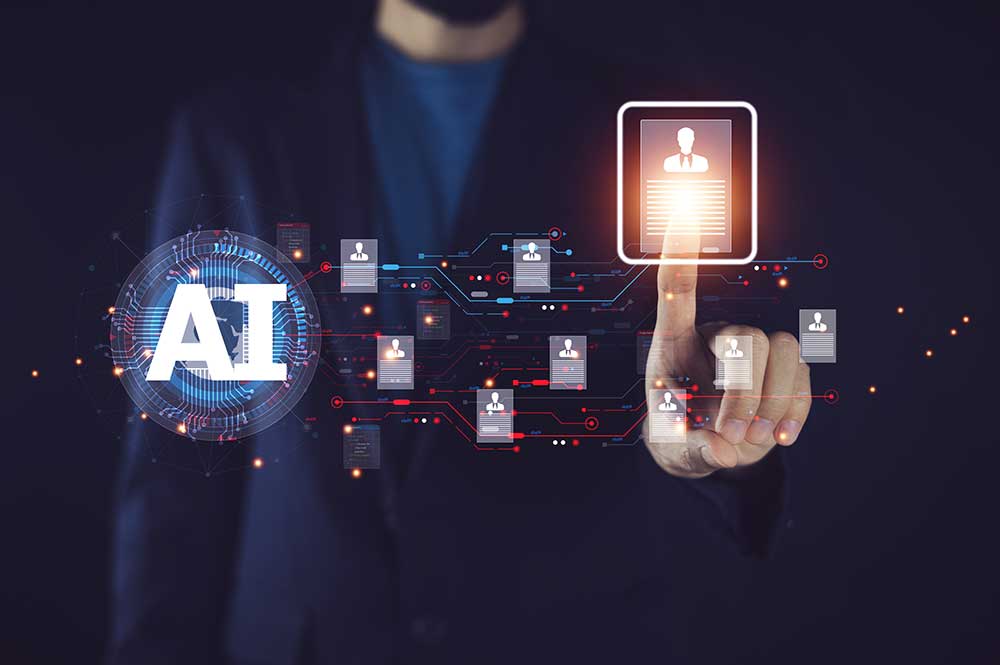Date: January 16, 2025
It’s not a surprise anymore—recruitment has entered a new era. A large portion of the credit belongs to technical breakthroughs, namely in artificial intelligence (AI) and automation. AI and automation are changing how businesses source, hire, and manage workers.
LinkedIn’s 2024 ‘Future of Recruiting‘ research reveals that recruiting teams are under greater pressure than ever to generate outcomes. Against this backdrop, the use of AI and automation emerges as an adaptation tactic in addition to a technological reform. After all, what is sourcing in HR if not constant adaptation and flexibility?
Recruitment strategies, with support from AI, can now meet new business needs and market demands. Artificial intelligence is becoming a great tool as companies battle changing economic conditions and more competition for skilled individuals. It improves candidate experiences, lowers operating costs, and increases efficiency.
While many companies are starting to utilize artificial intelligence, most have not yet completely embraced generative artificial intelligence technology. This helps forward-looking companies to have an edge. Are you among them? Find out how AI and automation are affecting current talent sourcing in the next section.
A New Chapter in Talent Acquisition
Conventional methods of how to source candidates have consistently been the most widely-accepted form of hiring. These include applicant interviews, resume reviews, and open job advertising. However, today, conventional approaches fall short when it comes to meeting the demands of the job market.
Majorly, the need for highly skilled professionals who are also good with data and technology has made employment more competitive. The only solution to such competitiveness is if companies strive to develop fresh and up-to-date strategies to attract and retain top talent.
Only around 27% of recruiters are actively using or experimenting with generative AI. This leaves room for a lot of growth, since almost 62% of recruiters are positive about AI’s potential in recruitment. Fortunately, more organizations have begun to understand the benefits AI can bring. We can expect the gap between AI’s potential and its application to close quickly.
In fact, many leading organizations around the world have already adapted their processes and improved them with AI to enhance efficiency and decision-making. Unilever uses artificial intelligence, for instance, to assess applicants during online interviews.
AI helps analyze replies to find important traits that fit the most successful workers of the company. Thanks to this data-driven strategy, recruiters may make more informed judgments. It also affects methods of hiring a strong workforce and developing plans on how to source diverse talent.
L’Oréal uses artificial intelligence in the same line to communicate with applicants by analyzing their answers to certain questions. It then rates them in relation to the characteristics of effective workers for the company.
These artificial intelligence solutions help to recruit by automating initial evaluations and improving applicant involvement. They also help to reduce human prejudice and improve the objectivity of choosing who to hire. This naturally produces better recruitment results for the company as well as for the applicants.
Common Types of AI Tools for Talent Acquisition
AI-backed tools and software have shifted towards a central position in the overall recruitment scenario. Such tools help speed up tasks that would otherwise demand a considerable investment in terms of time as well as resources. Recruiters and talent sourcers may then concentrate on more critical objectives such better process management and relationship development.
So, what are the best sourcing tools for recruiters? Let’s review some of the most prevalent artificial intelligence and automation techniques available in the recruiting sector today.
1. Resume Parsers
Resume parsers are one of the first AI tools that many recruitment teams adopted. These programs analyze resumes and cover letters for keywords and phrases that correspond with job descriptions. AI systems may efficiently discover the right people based on established criteria, eliminating the need for human resume reviews. This accelerates the recruitment process.
2. Chatbots and Virtual Assistants
Almost all sectors have started to use virtual assistants and chatbots in some or the other capacity. The recruitment industry is no different; in fact; it can benefit more from the use of such technology.
Chatbots can help recruiters and talent sourcers preserve their time by handling common daily engagement and communication with potential candidates or applicants. In fact, chatbots can also come in handy for pre-qualifying candidates who have applied to a particular job opening.
The first point of contact with candidates may be an AI-powered chatbot that talks and communicates with them about the job description. These technologies help in pre-screening applicants and responding to basic questions about job descriptions.
As LinkedIn’s report points out, 57% of recruiters find that AI tools make it easier and quicker to write job descriptions, while 41% say they increase overall productivity. Chatbots also facilitate personalized communication with candidates, ensuring a smoother and more responsive experience. The initial method of contact with applicants could be an AI-powered chatbot, which discusses and engages with them about the job description.
These technologies aid in pre-screening individuals and providing responses to basic queries concerning job descriptions.
A lot of applicants may have the same questions about the hiring process or the job description at times. Having to answer each of these questions by hand can take a staff member a lot of time and focus. In fact, it might even take the focus away from more important tasks.
To assist in such circumstances, chatbots can answer basic but often repeated inquiries such as “how do you source candidates?” or “how many rounds of interviews can I expect?”
3. Automated Candidate Engagement
In addition to evaluating applications and conducting initial screenings, artificial intelligence technologies provide continuous communication with candidates. These technologies could inform applicants about the employment process, send follow-up messages from managers, and assist with arranging interviews.
This automation ensures that candidates are kept up to date and engaged, which reduces the risk of missing out on exceptional potential due to inadequate communication.
Advantages of Using AI in Hiring
Recruiters are increasingly embracing generative AI to enhance their processes, get faster outcomes, and have more productive discussions with prospective workers. Let’s examine the primary ways in which artificial intelligence may assist with the whole employment process.
Time and Cost Efficiency
The capacity of artificial intelligence to save time and lower running expenses is among its most important benefits for recruiting. 57% of respondents to LinkedIn’s Future of Recruiting research said generative AI technologies enable them to create job descriptions quicker and more effectively. Through automating this tiresome task, artificial intelligence releases time for more significant initiatives for recruiters. These cover candidate involvement or improving sources of ideas.
Moreover, 45% of recruiters claim that technologies driven by artificial intelligence assist to automate tedious processes, freeing them to concentrate on more valuable work. These instruments help to lower the need for human effort. This reduces recruiting expenses and increases the general effectiveness of the employment process in turn.
Increased Productivity
With AI handling routine tasks such as resume screening and scheduling interviews, recruiters can give more time to tasks that require human judgment and expertise. 41% of recruiters say AI tools have helped boost their overall productivity. They do so by automating administrative processes, which can take up a significant portion of a recruiter’s time.
Such a degree of efficiency helps recruiters manage higher volumes of applicants without sacrificing quality in the hiring process.
In addition, 42% of experts in talent acquisition noted how artificial intelligence helps them in cutting down on everyday routine chores. They can now devote more time to developing long-term recruiting strategies and building relationships with candidates.
Enhanced Candidate Involvement
Apart from simplifying internal processes, AI solutions are enhancing the applicant experience by means of quicker and more tailored correspondence. 35% of recruiters say generative AI technologies simplify and speed up their interactions with prospects, whether via automatic answers or chatbots that can instantly answer applicants’ inquiries in real-time.
In a competitive talent market, where applicants want quick updates, this swifter involvement is especially timely and relevant. Furthermore noted is the likelihood of applicants accepting a job offer and staying with the company who go through a strong recruiting or talent sourcing process.
Basically, by automating first phases of communication, artificial intelligence guarantees applicants remain informed and feel valued all through the employment process. This raises the possibility of drawing top talent.
Better Candidate Matching
Additionally, AI technologies are making it easier to choose the best candidates.To identify the best candidate for the job, artificial intelligence algorithms can analyze a lot of data alongside a wide range of attributes.
Recruiters can enter job descriptions, allowing AI to sift through and identify the primary credentials, experience, and requirements. These AI solutions also can provide the organizations with insights on how to source tech talent more effectively and select the best candidates.
In a nutshell, AI diminishes the chances for human error while increasing the chances of success in hiring. Indeed, 41% of the recruiters said the hiring results got better with AI and automation. In many ways, they believe that this could be due to the faster and more precise evaluation of a variety of candidate profiles than humanistic techniques. This allows talent sourcing strategies to result in more sensible hiring and staffing options.
Effort Scalability in Recruitment
One advantage of AI technologies in hiring is scalability as well. Whether they are hiring for a small team or a large workforce, artificial intelligence just handles and assesses vast numbers of applications. For companies that are seeing fast expansion specifically, this scalability is very helpful. It’s also a benefit for those with a high turnover rate.
Automating initial candidate sourcing and screening, talent sourcers can focus on nurturing high-potential candidates. They can also devote more time to ensuring that every applicant receives fair and thorough consideration. To fulfill the expectations of fast-paced employment settings, one must scale recruitment operations while ensuring adherence to high standards throughout the applicant selection process.
Ethical Issues in AI Hiring
Despite the many advantages, it is important to weigh the ethical ramifications of the use of artificial intelligence in recruitment. This is a primary requirement for how to be a good talent sourcer. These issues largely revolve on prejudice, privacy, and data accuracy. Check out some of these issues below.
- Bias: AI systems take on the biases that are present in the data they are trained on. AI has the potential to magnify and promote the biases apparent in past recruitment records. It is the responsibility of teams to ensure that AI systems are not discriminating against qualified candidates because of their gender, religion, color, or age.
- Privacy: AI technologies manage sensitive candidate information, thus they need to follow tight protection rules. It is the responsibility of the teams to ensure that all AI systems adhere to privacy regulations like the General Data Protection Regulation (GDPR), anonymize personal data, and maintain secure data storage.
- Reliability: While AI systems are very efficient, they are not immune to mistakes. Therefore, it is important to have constant human supervision over the entire AI recruitment process and any other tasks under automation. Recruiters must be responsible and validate the results and actions of any AI or automation software. It’s important to make sure that each decision that the use of AI influences is in line with the mission, vision, and values of your organization.
Recommendations for Successfully Integrating AI into Your Hiring Process
When thinking about how to employ AI for recruitment, businesses should keep the following guidelines in mind:
- Make Sure you Choose the Right Tools: Examine your hiring needs to identify the areas where artificial intelligence may have the largest impact. Match your objectives with the appropriate software and tools, whether they include evaluating applications, interviewing applicants, or engaging candidates.
- Spend on Training: Teach your HR staff efficient use of artificial intelligence technologies.This will reduce mistakes and allow for a smooth transition to AI-driven recruitment.
- Track and Simplify: You should check how your artificial intelligence system performs and, if needed, modify the process flow or parameters. This ongoing observation seeks to simplify and expedite the process and help you to accomplish the specified goals. It will enhance the effectiveness of your hiring procedure and provide better results.
- Maintain a Human Touch: If AI excels at automation, what does a talent sourcer do? Talent sourcers must handle relationship-building, cultural fit assessment, and candidate experience. Use AI to complement talent sourcers’ and recruiters’ work, not replace their role in the process.
To Sum Up
The function of talent acquisition will also evolve as more potent artificial intelligence techniques develop. AI will provide recruiters the tools they need to concentrate on higher-value jobs, not replace them. Automating repetitive tasks, recruiters will have more time to interact with applicants, develop recruitment strategies, and support more general corporate objectives.
As Gregory Karanastasis, Global Head of Talent Acquisition at Accenture, points out, “The way that we’re doing work is literally going to change, which means that the recruiter moves up in the value chain.” Recruiters who can combine artificial intelligence-driven efficiency with human empathy and judgment will flourish in the next few years. They will be positioned to attract, acquire, and keep elite talent.




